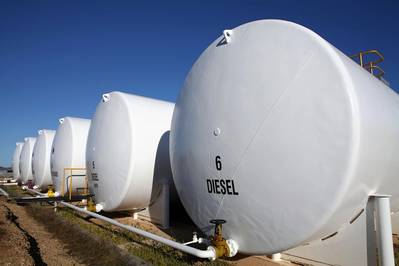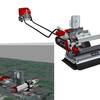Next Generation of Corrosion Inhibiting Fuel Additives
Cortec has developed the next generation of VpCI fuel additives for more potent corrosion protection of fuel systems. Cortec VpCI-707 has been specially formulated to protect fuel tanks and systems from corrosion and sludge formation without damaging copper and aluminum.
It is an option for keeping new and existing fuel tanks and systems in good condition during day-to-day operation and especially during vulnerable times such as intermittent operation, storage, or shipment. Other benefits of VpCI-707 are its improved water handling and good injector-cleaning capabilities. VpC -707 does not contain trace metals, chlorides, chromates, nitrites, phosphates, or secondary amines.
Because of its combined contact-phase and vapor-phase action, VpCI-707 effectively provides corrosion protection to metal surfaces not only in direct contact with the treated fuel, but also in the void space above the fuel line. This allows VpCI-707 to be applied at a very low dose compared to the volume of the tank being protected. VpCI-707 can be added directly to gasoline or diesel fuel in blending, storage, or vehicle tanks. It can also be fogged as a concentrate into dry fuel tanks before storage and shipment.
Comparing Cortec Fuel Additive Protection
With the development of VpCI-707, Cortec R&D has made an excellent improvement to its fuel additive offerings. VpCI-707 outperforms VpCI-705 in many aspects, including fuel stability and contact- and vapor-phase corrosion protection. While VpCI-705 remains an excellent preservation tool with a long-standing history, VpCI-707 represents the newest generation of corrosion protection in fuel systems. Compared to VpCI-706, which provides the strongest vapor-phase protection of all three additives but is corrosive to copper, Cortec’s new VpCI-707 is a powerful alternative for use when multi-metal protection is needed, or when protection is needed for fuel components that may not be fully enclosed.
The Importance of Fuel Additives
Applying a good corrosion inhibiting additive to fuel tanks and systems is an important part of the preservation process especially when vehicles, tanks, or equipment will be going through a period of disuse. Otherwise, harsh environments and stagnation can lead to sludge formation and the deterioration of even new metal components. VpCI-707 can be used for fuel stabilization and corrosion protection in countless applications like the following:
- Large or small fuel storage tanks
- Heavy equipment or vehicles being shipped overseas
- Equipment operating in harsh industrial or offshore environments
- Generators or other equipment going into seasonal storage
- Industrial plants going into temporary layup















